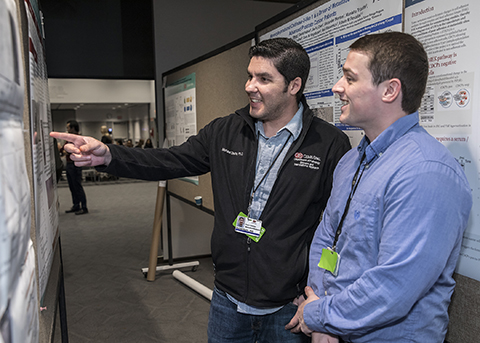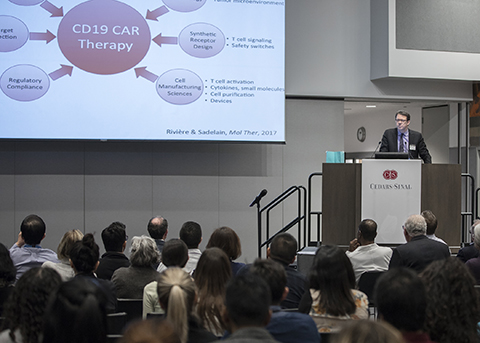Research Day: Crafting Cancer-Killing Drugs
It's not every day that you can spend your lunch hour learning about a historic breakthrough in cancer treatment from the physician-scientist who helped achieve it. That rare opportunity helped draw a capacity crowd to Harvey Morse Auditorium last month to hear Michel Sadelain, MD, PhD, deliver the keynote address at Research Day, an annual showcase of scientific achievements at Cedars-Sinai.

Michael Doche (left), PhD, project scientist in the Cedars-Sinai Biobank and Translational Research Core, explains his research on a new method of collecting prostate tissue to Joshua Saylor, research associate in the laboratory of Beatrice Knudsen, MD, PhD, medical director of the biobank.
Sadelain, director of the Center for Cell Engineering and the Gene Transfer and Gene Expression Laboratory at Memorial Sloan Kettering Cancer Center in New York, helped forge the future of immunotherapy—which harnesses the immune system to fight diseases—by proving that human cells can be transformed into cancer-killing drugs.
This milestone achievement was nearly 30 years in the making, Sadelain explained. It began in the 1990s, when as a postdoctoral student at the Massachusetts Institute of Technology, he was intrigued by innovative genetic engineering tools designed to introduce genes into T cells—a type of immune-response cell—with the goal of creating cancer fighters.
In 2002, Sadelain and his research team demonstrated that T cells can be removed from a patient and then genetically engineered to produce chimeric antigen receptors (CARs) on the cells' surface. CARs are synthetic receptors that arm T cells with proteins capable of recognizing cancer. The genetically engineered T cells, when returned to the patient through infusion, not only kill tumor cells—they persist in the body as "living drugs." CAR T-cell therapy was born.
The next year, Sadelain's team published a seminal paper demonstrating that CAR T cells equipped with a protein known as CD19 could fight leukemia in a mouse model. "We then set out to translate our mouse-model success to the clinic," Sadelain said. They achieved their goal last year when the U.S. Food and Drug Administration (FDA) approved CD19 CAR T-cell therapy for treatment of acute lymphoblastic leukemia in certain children and young adults and also for certain patients with non-Hodgkin lymphoma.
Most recently, in the Feb. 1 issue of the New England Journal of Medicine, Sadelain and colleagues published results of a phase 1 clinical trial of 53 adults with acute lymphoblastic leukemia who received CD19 CAR T-cell therapy. Complete remission was achieved in 83 percent of these patients.
While tremendous strides have been made in CAR T-cell therapy, Sadelain said challenges remain, including managing side effects and applying the approach to more types of cancer.

Keynote speaker Michel Sadelain, MD, PhD, discusses one of several immunotherapy breakthroughs he pioneered.
Looking ahead, Sadelain said: "My hope is that CD19 CAR T-cell therapy is just the tip of the iceberg. T cells aren't just for oncology. They could be used to reprogram regulatory cells, harnessed to fight infections or even pave the way for the other big giant-regenerative medicine."
Sadelain's presentation was followed by a poster session showcasing more than 130 Cedars-Sinai research projects covering an expansive range of topics, including how the brain stores memories and a novel strategy for early detection of prostate cancer.
Three prizes were awarded for the best posters:
- First prize: Rebecca Meza, research associate III, from the laboratory of Edwin Posadas, MD, associate professor of Medicine and medical director of the Urologic Oncology Program at the Cedars-Sinai Samuel Oschin Comprehensive Cancer Center. Meza was a contributing author on a study showing that in some prostate cancer patients the secretion of a protein called Chitinase 3-like 1 can cause tumor cells to spread and further harm the patient.
- Second prize: Shirley Cheng, research associate I, also from the Posadas laboratory. Cheng is part of a research team that identified a specific group of circulating tumor cells that can help flag prostate cancer patients who are likely to have a more aggressive cancer that responds poorly to treatment, resulting in shortened survival.
- Third prize: Austin Yeon, research associate I, from the laboratory of Jayoung Kim, PhD, research scientist and associate professor of Surgery and Biomedical Sciences. Yeon contributed to a study demonstrating that resistance to the standard chemotherapy treatment for bladder cancer potentially can be overcome by adjusting the lipid metabolism of resistant bladder cancer cells.
